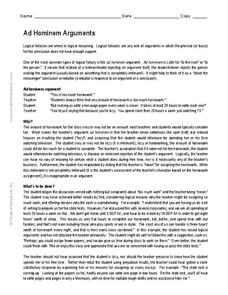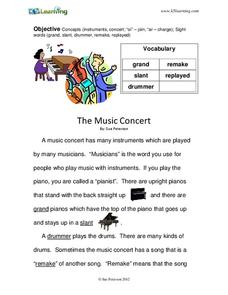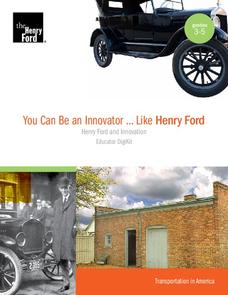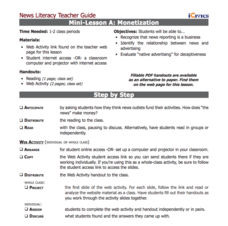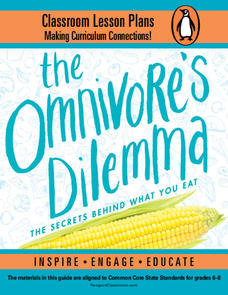Maine Content Literacy Project
Dramatic Structure of the Short Story
The second lesson in a series of fourteen, this plan takes the short story basics a step further. Learners complete a quiz about the story from the previous day, discuss the text, learn about Anton Chekhov, and work in groups to begin...
PreKinders
A World of Shapes
There are shapes everywhere you see! Use a presentation about shapes to encourage young learners to find squares, circles, triangles, and rectangles in a series of pictures. One slide shows kids what the shapes look like, and then a...
Student Handouts
Ad Hominem Arguments
Give your class a lesson in logical reasoning. This learning exercise, which focuses on ad hominem arguments, goes step by step through an example. After examining the argument, learners assess a second conversation for ad hominem...
Reading Resource
Letters in My Name/Friend's Name
After kids learn how to write their names, have them explore each letter with a fun worksheet. They write the letters in their names in the left column, then decipher which letters in the alphabet are not in their name. The second page...
Reading Resource
/ie/ Word List
This activity, the second in a series of 16 resources designed to develop the awareness skills needed to detect the vowel sounds in words, asks readers to identify and highlight the /ie/ sound in a list of 39 words. After identifying the...
Reading Resource
/ae/ Word List
As part of a program to develop phonemic awareness, beginning readers are asked to identify and highlight the /ae/ sound in a list of 54 words. The exercise is the second in a series of 16 resources designed to develop the awareness...
K5 Learning
The Music Concert
Second graders read an informational text passage on music concerts and then answer questions based on what they read.
K5 Learning
Rhyming Animals
Second graders read an informational text passage on animals, as well as a poem that incorporates rhyming words. Then, 2nd graders answer questions based on what they read.
K5 Learning
The Great Sphinx Statue
Second graders read an informational text passage on the Great Sphinx, and answer questions based on what they read.
K5 Learning
The Moon
Second graders read a short informational text passage about the moon and answer a series of questions based on what they read.
Curated OER
Abstract Nouns and Concrete Nouns
Practice identifying concrete and abstract nouns with a learning exercise that offers three different ways to show what enthusiastic grammarians know. First, pupils read a passage and identify the nouns; second, they think up three more...
Teach-nology
Reading Comprehension: Compare and Contrast
What do a zoo and a farm have in common? Second graders read about each place, and compare and contrast the details using two multiple choice questions.
Frank Macias Elementary School
Preparing for Guided Reading
Take your guided reading lesson plans to the next level with a collection of printables, templates, and reference tools equipped to support the reading needs of your readers. Included is a detailed information page, grouping sheet,...
English Worksheets Land
Point of View
Point of view—first, second, and third person—is the focus of a worksheet in which scholars read, identify, and color sentences.
US Department of State
Reader's Theater: The Adventures of Tom Sawyer
The opening chapters of Mark Twain's masterpiece, The Adventures of Tom Sawyer, can be daunting for some readers. A reader's theater assignment divides the second chapter of the novel into a seven-role script, allowing readers to work...
K5 Learning
The Bomb
Second graders read a brief passage about King Charles XII of Sweden who lived over 200 years ago. Then, they respond to four short answer questions about what they read.
Henry Ford Museum
You Can Be an Innovator ... Like Henry Ford
Why did Henry Ford want to invent a car for the masses? Why did Henry Ford locate his factory in Detroit? Why did Henry Ford encourage the idea of a 5-day work week? Young innovators find the answers to these and other question in a unit...
K5 Learning
Hide and Seek
Hide and seek is a lot of fun whether you're the hider or the seeker! Second graders read a short passage about a game of hide and seek before answering four reading questions.
Nosapo
Writing Prompt: Write About a Photo
Practice descriptive writing with a prompt that includes a photograph. Writers craft the whole story of the single second caught in a photo using the provided questions to prompt their imaginations.
iCivics
Mini Lesson A: Monetization
Advertising is everywhere! Does your class know that their attention span is for sale, even when they're watching a simple news story? The second installment in a five-part series from iCivics examines the relationship between news...
Roald Dahl
The Twits - Mrs Twit
"A person who has good thoughts cannot ever be ugly." The second lesson in an 11-part unit that accompanies The Twits by Roald Dahl uses poetry to encourage positive character traits. Mrs. Twit has ugly thoughts, but those thoughts can...
University of North Carolina
Introductions
You never get a second chance to make a first impression. According to the 11th handout in the 24-part Writing the Paper series, that's why writing a strong introduction is so important. The handout offers strategies for crafting...
Penguin Books
The Omnivore’s Dilemma, Young Readers Edition
As the saying goes, you are what you eat. A useful set of lesson plans encourage young readers to take a second look at their eating habits. Pre- and post-reading questions bring in reflective writing and discussion while extension...
Federal Trade Commission
Ad Targeting and Techniques
What techniques do advertisers use to reach a target audience? Pupils discover the answer with the second of four Admongo lesson plans. Scholars learn about the most common strategies advertisers use to convince people to buy something....




